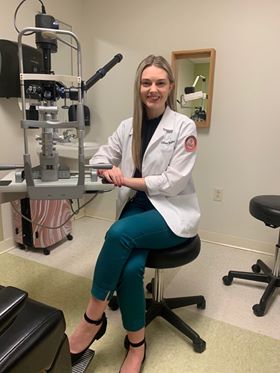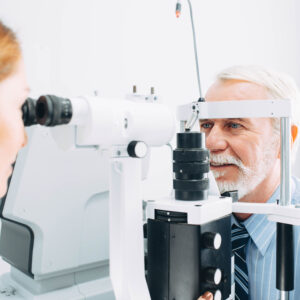About two months prior to the COVID-19 outbreak, my classmates and I started seeing patients at Salus University’s optometric clinic, The Eye Institute, located in Northern Philadelphia. Fresh out from completing all of our clinical skills courses, we were eager to start seeing patients and finally put our training to use. 
I tried to enter clinic with no preconceived ideas or expectations set in my mind, but I was still surprised during my experience. Here are a few of the stand-out things I learned during the very beginning of my time in clinic:
-
“Real” patients are very, VERY different from your classmates.
When you first learn how to perform tonometry, gonioscopy, indirect biomicroscopy and pretty much every other optometric skill, it’s incredibly difficult to perform on your classmates who are pretty much perfect patients because they know what to expect. The second you get into clinic, all that goes to the wayside. Clinic patients can be fidgety, more sensitive to light, and all around more difficult, making it even harder to perform these skills. You also should expect the majority of the eyes you see in clinic to look very different from those of your classmates. This is because most of your classmates are likely young, healthy individuals with no serious ocular pathology. The plus side to this is that the more normal eyes you see, the easier it will be to recognize when something is abnormal in the eye.
-
Efficiency is key.
If you were to perform every clinical skill during a real exam in the maximum time allotted during a practical, you’d probably be doing a four-hour exam on your patient. Now that I think about it, I’m pretty sure I spent four hours on my first exam in clinic. That being said, it is important to still give a thorough exam and not cut corners. But, there are ways to make your exam more efficient. A lot of it will just come with repetition and confidence from every new patient encounter, but you can always ask upperclassmen or preceptors for specific efficiency tips if you’re struggling with your exam times.
-
Your classmates are your best reference.
I can’t emphasize enough how valuable your classmates are throughout your entire optometric education; this is especially true when you first enter clinic. The way our university eases us into patient care is by pairing us up for each patient exam at first. This is incredibly helpful because you have an extra set of hands for charting, and extra set of eyes for peeking  into the teaching tube, and an extra brain for assessment and plan. I have relied on my core clinic group so many times for help with tricky cases or just that extra nudge of reassurance. We are all constantly pushing each other to be the best doctors we can be, which is something that we really hadn’t had an opportunity to do prior to being in clinic.
into the teaching tube, and an extra brain for assessment and plan. I have relied on my core clinic group so many times for help with tricky cases or just that extra nudge of reassurance. We are all constantly pushing each other to be the best doctors we can be, which is something that we really hadn’t had an opportunity to do prior to being in clinic.
-
Your preceptors aren’t THAT scary…most of the time.
My first day in clinic I was absolutely terrified that I was going to do something incredibly stupid and have to feel the wrath of my preceptor. Much to my surprise, I didn’t do anything incredibly stupid and my preceptor was very encouraging. Our preceptors, at least at the beginning, didn’t expect us to know everything. I’ve learned that they prefer honesty and appreciate when you’re upfront about things you did wrong or things you’re not sure of. At the end of the day, the preceptors genuinely want us to succeed and be the best clinicians we can be. Preceptors can be harsh at times, but it’s only because they want us to learn from our mistakes and do better with future patient cases.
-
You truly never know what to expect.
If I learned anything at all during my few short weeks in clinic thus far, it would be that you can never really know what kind of case is going to walk in and sit in your exam chair. Sometimes, no amount of chart-reviewing, coaching, or clinical knowledge can prepare you for the whacky case that takes you in a totally different direction than anticipated. During my first few patient encounters, I was too focused on where I thought the exam was going that I missed out on important signs for other things going on.
In the future, when we return to clinic, I’m going to remind myself that every day is different and you truly never know what to expect – and that’s what makes clinic so exciting! Don’t forget to learn just as much from your mistakes as you do from your strengths.

